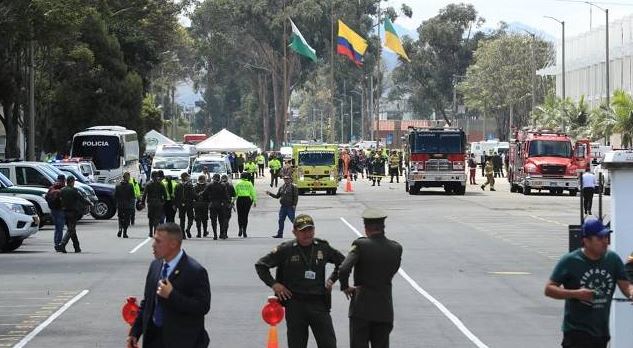
Local authorities have claimed that the organisation behind Thursday‘s terrorist attack was marxist guerilla group ELN (Ejército de Liberación Nacional). The group is now being held responsible for the deaths of 21 individuals and injuries of a further 68.
Only this time last year, the ELN were blamed for a similar attack against the Colombian police force. However, it has been eight years since the explosion of a car bomb in the city of Bogotá, with yesterday’s events bringing back memories of an era that most would prefer to forget.
Authorities remain in the process of conducting a thorough investigation but so far the man responsible for the explosion has been named as José Alademar Rojas Rodríguez, who died at the scene.
Rojas Rodríguez, who was driving a vehicle armed with approximately 80 kg of a powerful explosive, is thought to have accelerated over a stretch of 200m in order to force entry into the Escuela General Santander, a police training academy, having been denied access by security guards. Shortly after, the car exploded.
According to reports by the Fiscalía General de la Nación, 57-year-old Rojas Rodríguez had been linked to the Domingo Lain chapter of the ELN for over 33 years and was a part of the group’s urban factions in the city.
President Iván Duque made two public statements in response to the attack upon his return from Quibdó.
“This morning, the Police Cadet School General Francisco de Paula Santander in Bogotá suffered a miserable terrorist attack,” he began a broadcast yesterday, live from the Casa de Nariño. “This shameful attack, in an educational centre, against young students, took the lives of first-year cadets and injured other young people who were on their way to becoming policemen of this country.”
“This attack was against our youth, against our freedom, against all Colombians,” the president stated, inviting the country to put up a united front against terrorism, in perhaps the toughest challenge of his presidency to date.
Last year, President Duque declared his refusal to negotiate with the ELN until they “release captives and end all criminal activities.” In the face of yesterday’s events, Miguel Ceballos has reiterated this on behalf of the Alto Comisionado para la Paz.
“Together with the Ministry of Defence, we identify that the ELN has committed over 400 acts against human rights, and over 100 people have been assassinated…There will be no space for dialogue with the ELN until they turn in all captives and completely renounce all criminal acts. We are not going to negotiate against terrorism,” Ceballos said.
Security analyst Sergio Guzman told The Bogotá Post that the attack might represent a seachange in President Duque’s reactions, particularly as it concerns Venezuela.
“This bombing was significant because it was the first to happen under Duque’s watch and his presidency will be shaped by his reaction to it,” Guzman said, “As Venezuela is a known base for the ELN, an event like this can act as a flashpoint for escalating tensions between the two nations.”
Friends and family that lost loved ones in yesterday’s attack have since gathered at the Escuela General Santander to lay flowers and light candles in honour of those that lost their lives.
Urging Colombians to have faith in state intelligence, Mayor of Bogotá Enrique Peñalosa invited citizens to take part in a national march tomorrow across the country. In the capital, the two meeting points will be the Parque Nacional and Centro de Memoria, where marchers are invited to gather at 9am.





